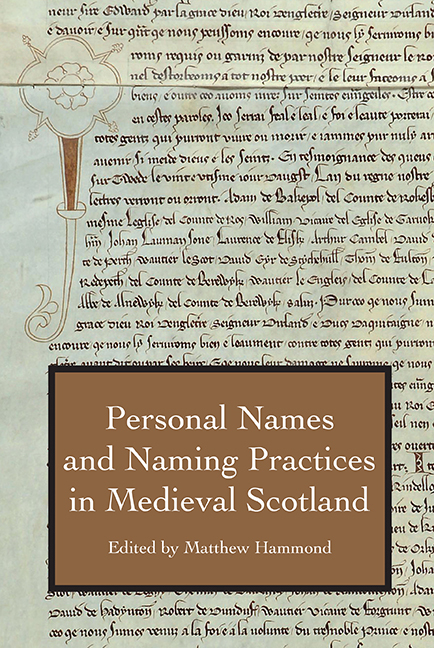Book contents
- Frontmatter
- Dedication
- Contents
- List of Tables
- Acknowledgements
- List of Contributors
- Abbreviations
- Note on the Text
- 1 Introduction: The Study of Personal Names in Medieval Scotland
- 2 Personal Names in Early Medieval Gaelic Chronicles
- 3 Gaelic Personal Names and Name Elements in Scottish Charters, 1093–1286
- 4 The Development of Mac Surnames in the Gaelic World
- 5 Forflissa/Forbflaith/Hvarflöð
- 6 Masculine Given Names of Germanic Origin in the Ragman Roll (1296)
- 7 The Romance of Names: Literary Personal Names in Twelfth- and Thirteenth-Century Scotland
- 8 Old Testament Personal Names in Scotland Before The Wars of Independence
- 9 Duthac Wigmore and Ninian Wallace: Scottish Saints and Personal Names in the later Middle Ages
- 10 Saints in Names in Late Medieval Argyll: a Preliminary Enquiry
- Bibliography
- Index
- Studies in Celtic History
6 - Masculine Given Names of Germanic Origin in the Ragman Roll (1296)
Published online by Cambridge University Press: 18 September 2019
- Frontmatter
- Dedication
- Contents
- List of Tables
- Acknowledgements
- List of Contributors
- Abbreviations
- Note on the Text
- 1 Introduction: The Study of Personal Names in Medieval Scotland
- 2 Personal Names in Early Medieval Gaelic Chronicles
- 3 Gaelic Personal Names and Name Elements in Scottish Charters, 1093–1286
- 4 The Development of Mac Surnames in the Gaelic World
- 5 Forflissa/Forbflaith/Hvarflöð
- 6 Masculine Given Names of Germanic Origin in the Ragman Roll (1296)
- 7 The Romance of Names: Literary Personal Names in Twelfth- and Thirteenth-Century Scotland
- 8 Old Testament Personal Names in Scotland Before The Wars of Independence
- 9 Duthac Wigmore and Ninian Wallace: Scottish Saints and Personal Names in the later Middle Ages
- 10 Saints in Names in Late Medieval Argyll: a Preliminary Enquiry
- Bibliography
- Index
- Studies in Celtic History
Summary
The so-called Ragman Roll records fealties and, in some cases, homages as well, given by Scottish nobles, landholders, prelates, and burgesses to Edward I of England upon completion of the military campaign of spring–summer 1296, capping off the successful English invasion of Scotland. Individual oath performances date back to the early summer of 1296, but most homages and fealties took place during the Berwick parliament of 28 August 1296. These documents show ca 1900 name occurrences, for ca 1638 to 1666 individuals.
The oldest witness of the instrumenta is kept at the National Archives, Kew, Scottish documents section, under the shelfmark E39/17/4, a copy of which is preserved at the Archives Nationales de France; the most important and complete copies, however, were written by the Yorkshire notary Andrew de Tange in 1306 and are kept at the National Archives, Kew, Scottish documents section, under the shelfmarks C47/23/3, C47/23/4, and C47/23/5. The seals of the oath performers were appended to the documents; they hung in groups from the parchment folios. According to McAndrew's survey, 912 of them have survived, although in many cases detached.
A first partial edition of C47/23/4 is Prynne's Antiquae constitutiones, 649–64; the reference edition is still Thomson's Instrumenta publica (henceforth IP), based on C47/23/3. A calendared English version of C47/23/4 is in Bain's Calendar of Documents relating to Scotland, vol. 2 (henceforth CDS ii), no. 823. A thorough description of the seals attached to the documents is to be found in Bain's appendices I to III. More recently, an in-depth scientific analysis of the seals contained in the documents of 1296 has been carried out by B. A. McAndrew. A number of oath performers of 1296 are described from a prosopographical point of view in the PoMS database (People of Medieval Scotland, 1093–1314).
As name-giving practices in Scotland during the central Middle Ages represent the result of the superimposition/fusion of linguistic and cultural layers, due to different influences, it has been rewarding to verify to what extent the Germanic element may have affected thirteenth-century masculine nomenclature in the light of the Ragman Roll witness. The cradle areas of single names have roughly been individuated; there are, however, a number of cultural reasons to be considered.
- Type
- Chapter
- Information
- Publisher: Boydell & BrewerPrint publication year: 2019



